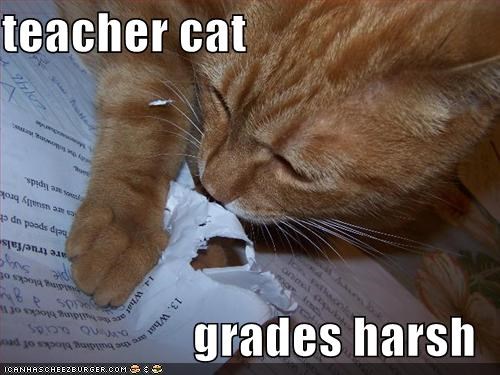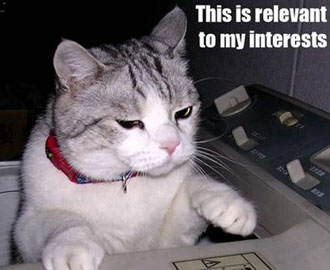About the Class
--Mark Zuckerberg, Founder, Facebook
Course Description
Contemporary social media, advertising, and computing often feature "feeds," -- a personalized list of changing items. Increasingly these are social feeds: they are modified by your relationships with other people. This course considers social feeds. We will investigate the user experience of feeds, feed interaction design, feed business strategies, feed relevance algorithms, feed fiascoes, social feeds as data, and audience targeting via feeds: all across the contexts of commerce, news, education, and expression.
Learning Objectives
At the conclusion of this course, you should be able to:
- Convey how feed-related personalization works at a conceptual level. (*)
- Identify likely strengths and weaknesses of specific feed designs from multiple perspectives.
- Contrast the incentives of actors in the major feed ecologies of social media, advertising, and computing.
- Catalog the different forms of value feeds provide to software developers, platforms, advertisers, and users.
- Critically assess some feed-related audience metrics and interaction data and indicate their strengths, weaknesses, and possible implications.
- Predict the public relations and regulatory pitfalls that might result from some feed designs in the domains of privacy, discrimination, antitrust, fraud, and payola.
- Demonstrate familiarity with alternative and experimental feed interfaces and the future possibilities of feeds.
(*) - For this class, a technical understanding of the operation of feeds is not required, but some students may be interested in acquiring a technical understanding anyway, e.g., via the final project.
Course Credit
- This elective course has no prerequisites and is open to students from any major or level.
- Completing this course provides three units of undergraduate credit.
- This course counts as/towards:
- an elective on the "Social Media" path of the B.S.I. degree in Information.
- an elective on the "User Experience Design" path of the B.S.I. degree in Information.
- an elective on the "Information Analysis" path of the B.S.I. degree in Information.
- an "advanced communication study" elective for the Major in Communication Studies.
- the Minor in Science, Technology, and Society.
- the Minor in Digital Studies.
Class Structure
 (Image credit: memecenter.com.)
(Image credit: memecenter.com.)
The course consists of two lectures each week. These may also include discussion and in-lecture activities. Class meetings supplement but do not duplicate the readings; readings supplement but do not duplicate the class meetings. Some of the course content is available only from class meetings and students are responsible for that material. There are no discussion sections.
Overall, the bulk of the assessment work in this course (60%) consists of three multiple-choice exams. All three are equally weighted -- there is no traditional midterm or final. There are no surprise or "pop" quizzes.
In addition, a weekly question will be posed and graded on a pass/fail basis to ensure that students are keeping up with the readings and that a combined lecture/discussion format remains viable. These weekly questions may require a short activity. If a student fails a weekly question after making an honest attempt, they may submit a revision for a second chance at a passing grade.
A final project counts as a final exam for this course: there is no other final exam. The final project must be completed in order to receive a passing grade in this course. It is presented during the final exam period.
In-person attendance is required. However, some time after each lecture, a recording of the lecture will be made available on the course Web site, along with lecture slides. These are meant for review. In the event that a lecture video is not made available (e.g., due to technical problems) you are still responsible for the content of that lecture. You are expected to attend lecture and attendance is part of your course grade. Students verify attendance in lecture by answering a short lecture question that may be posed at any time during the lecture, including the beginning. Not answering the day's lecture question counts as an absence, even if you attended part of the lecture that day.
Overall Expectations
- Attend all lectures and the final exam period. Verify your attendance in lecture by answering the lecture questions each day.
- Submit the weekly questions, take three exams, and complete a final project.
- Practice thoughtful, informed participation during in-lecture exercises and when answering weekly/lecture questions.
Grading
This course contains a broad spectrum of students with different skills, from noobs to hackers and in between. In order to ensure that those less comfortable are not at a disadvantage, this course is not graded on a curve, there are opportunities to revise assignments for a better grade, and there are extra credit opportunities. The teaching staff reserves the right to award additional points to reward remarkable effort and an upward trend in your work regardless of your starting point.
Your final grade will be weighted:
Weekly Questions: 15%
Exams: 60% (3 exams at 20% each)
Final Project: 20%
Attendance and Participation: 5%
Attendance and Participation include lecture attendance and answering the lecture questions. It may also include more generally your overall quality and quantity of contribution to the course.

Textbooks
There are no required textbooks for this course.
Course readings will be provided to you electronically at least two weeks before the reading is expected to be read (with the exception of the readings in the first two weeks). If you would like additional information about the course material, consider these optional textbooks.
Optional textbooks:
- Donath, J. 2014. The Social Machine: Designs for Living Online. MIT Press.
- Pasquale, Frank. 2015. The Black Box Society: The Secret Algorithms That Control Money and Information. Cambridge: Harvard University Press.
- Schneier, Bruce. 2015. Data and Goliath: The Hidden Battles to Collect Your Data and Control Your World. New York: W. W. Norton.
(Image credit: The Atlantic.)
Materials Costs
Some Final Projects (and possibly weekly questions) may involve specialized software and/or small online purchases. We think about these costs as we do textbook costs. We promise that we will recommend free or inexpensive software to you whenever possible. If the final project you choose involves online purchases, we do not anticipate the overall semester total will exceed $30, and in the past it is typically $0. A project involving an online purchase will probably require the use of a credit card. If you don't have a credit card, but you have someone you trust that will buy things for you (mom? a friend?) that will also work. If these costs are prohibitively expensive and would make it impossible to participate, e-mail the primary instructor to make alternate arrangements.
Major Deadlines
Deadline dates may change as the semester progresses. See the schedule page for deadlines.
Note that final project will be due during the final exam period for this course assigned by the registrar (Wednesday, December 21, 2016; 4-6 p.m.). You must attend the final exam period.
Use of Notes on Exams
There will be three multiple-choice exams given during the lecture period. These are closed book except that you may prepare and bring to class one 8 1/2 x 11" sheet of notes (typed or handwritten) to consult during the exam. You may use this sheet and a pencil to take the exam. No other aids may be used. You must turn in the sheet of notes with your exam.
Class Policies
- Class Attendance. You are expected to attend all class meetings and to be on time for class. Attendance is taken and factored into your grade (see "attendance and participation" above). If you arrive after attendance is taken or leave before it is taken this is counted as an absence.
- Electronics in the Classroom. No laptops, phones, or other electronics are allowed to be used during lecture unless an instructor specifically requests them for an in-lecture activity. If you need to use electronics during lecture for a legitimate reason, please ask an instructor.
- Late work and examinations. You are responsible for planning ahead and taking whatever steps are necessary to allow you to turn in assignments on the specified due dates and to be present for quizzes and the final exam period. Late work will not be accepted except in documented cases of illness or emergency (see below). Computer problems are not acceptable as an excuse for late work.
- Extended Illness, Emergencies, or Other Serious Unforeseen Situations. In the event of an emergency or other urgent unforeseen situation, the student should seek help from the University's Dean of Students. If an illness makes it impossible for a student to attend to their responsibilities in this class, students should contact their college or school to report the problem and get help.
- B.S.I. students should contact UMSI Student Affairs.
- LSA students should contact the LS&A Dean's office of student affairs. LSA students may use the LSA "Report an Illness" form.
- Academic Integrity. Unless otherwise stated in a specific assignment, all submitted work must be your own. Note that it is a violation of academic integrity to turn in the same work for more than one assignment without permission, including turning in work completed for a different class. It is also a violation of academic integrity to certify your attendance when you did not attend class, or to help someone else do so. The School of Information's Academic and Professional Integrity Policy contains very strict and explicit policies prohibiting plagiarism, cheating, fabrication, and facilitating these acts. Penalties for violations can be severe, such as an automatic failing grade in the course, dismissal from your degree program, and/or disciplinary suspension from the university. These rules will be strictly enforced and violations of academic integrity will be reported to the Dean's office.
- Students with Disabilities. If you think you need an accommodation for a disability, please let me know at your earliest convenience. Some aspects of this course, the assignments, the in-class activities, and the way the course is usually taught may be modified to facilitate your participation and progress. As soon as you make me aware of your needs, we can work with the Services for Students with Disabilities (SSD) office to help us determine appropriate academic accommodations. SSD (734-763-3000; http://ssd.umich.edu) typically recommends accommodations through a Verified Individualized Services and Accommodations (VISA) form. Any information you provide is private and confidential and will be treated as such.
- Student Mental Health and Wellbeing. The University of Michigan is committed to advancing the mental health and wellbeing of its students. If you or someone you know is feeling overwhelmed, depressed, and/or in need of support, services are available. For help, contact Counseling and Psychological Services (CAPS) at (734) 764-8312 and https://caps.umich.edu/ during and after hours, on weekends and holidays, or through its counselors physically located in schools on both North and Central Campus. You may also consult University Health Service (UHS) at (734) 764-8320 and http://www.uhs.umich.edu/mentalhealthsvcs, or for alcohol or drug concerns, see http://www.uhs.umich.edu/aodresources. For a listing of other mental health resources available on and off campus, visit: http://umich.edu/~mhealth/.
- Sexual Misconduct. The University of Michigan is committed to fostering a safe, productive learning environment. University policy prohibits discrimination on the basis of sex, which regards sexual misconduct — including harassment, domestic and dating violence, sexual assault, and stalking. Sexual violence can undermine students’ academic success and the university encourages students who have experienced some form of sexual misconduct to talk to someone about their experience, so they can get the support they need. Confidential support and academic advocacy can be found with the Sexual Assault Prevention and Awareness Center (SAPAC) on their 24-hour crisis line, (734) 936-3333 and at http://sapac.umich.edu/. Alleged violations can be non-confidentially reported to the Office for Institutional Equity (OIE) at institutional.equity@umich.edu. Reports to law enforcement can be made to University of Michigan Police Department at (734) 763-3434.
Legal Thingy
We record parts of our course to help students review the course material. To make this possible, by enrolling in this course as a student you authorize the University of Michigan and the SI 316/COMM 404 instructors, and anyone that the University or SI 316/COMM 404 instructors may permit, to film, videotape, audio record, and photograph you during SI 316/COMM 404 activities for subsequent broadcast or other dissemination in perpetuity through any media, which includes, without limitation, commercial and public radio, television, cable, and the Internet. And you acknowledge that you might not receive a copy of any film, videotape, audio recording, photograph, or computer file that is or may be produced. If you wish to opt-out of the lecture recording process contact the professor and you can be seated in an area of the lecture room not covered by a camera if a camera is being used. You should also be sure to avoid volunteering to participate in any recorded lecture activities (such as demos) at the front of the room if there is a camera present. As there are a variety of vehicles for course participation credit, avoiding lecture demos will not disadvantage your performance in the course.
(tl;dr)
